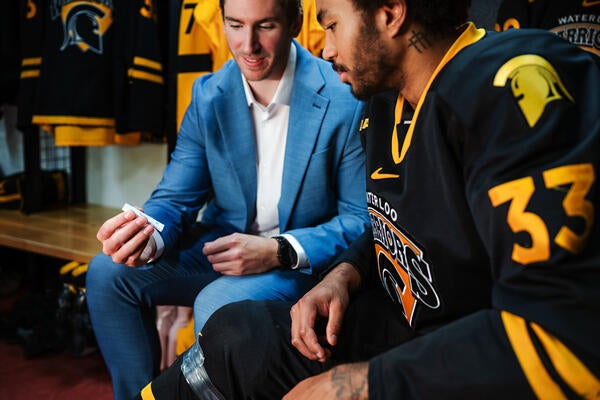
Delivering life-saving data to doctors
Founder Fuel: Student startup helps doctors treat surgical complications sooner

Founder Fuel: Student startup helps doctors treat surgical complications sooner
By Faculty of EngineeringThe entrepreneurship ecosystem at Waterloo Engineering nurtures promising ideas into thriving enterprises. In our weekly Founder Fuel series, we look at new ventures and how they have benefited from that crucial early support.
Youssef Helwa (BASc ’15, nanotechnology engineering, MASc ’17, electrical and computer engineering) arrived at Waterloo not long after Velocity launched and new ventures like Thalmic Labs were creating big buzz.
He quickly got seduced by the excitement of the startup world, co-founding NERv (scheduled to be renamed FluidAI) in 2014 with Amr Abdelgawad (BASc ’16, nanotechnology engineering, MBET ’17). Their smart monitoring system detects bleeding, leaks and infections after abdominal surgery so doctors can treat complications sooner.
The innovation earned them a place in Velocity, funding from the Engineer of the Future Fund and international attention as the 2019 winners of the Entrepreneurship World Cup.
 Youssef Helwa, CEO and co-founder of FluidAI.
Youssef Helwa, CEO and co-founder of FluidAI.
Developing medical technology isn’t cheap. That early support was critical to pay for research and development materials and refine the technology enough to attract private capital.
“The first $5,000, $25,000 or even the $50,000 cheque that we obtained, those were massive for us,” Helwa says.
Advice from professors, the Waterloo Institute for Nanotechnology and other up-and-coming companies in the Waterloo ecosystem was also invaluable. Startups like Intellijoint Surgical — another Waterloo Engineering medical technology success story — helped fuel their ambitions.
“These pioneers provide guidance down the chain,” says Helwa.
Today, the Kitchener company has raised about $65 million, employs more than two dozen people and, most significantly, recently received approval for its technology from Health Canada.
The company’s big challenge now is finding talent to continue growing. The highly regulated med-tech space requires advanced knowledge to navigate everything from patents to patient privacy, but Helwa is committed to staying in the region.
“We love it as founders,” he says. “We love it as a company. We love it as individuals.”
They are also committed to paying forward the support they received and helping the local ecosystem continue to grow and thrive.
This story first featured in WEAL 2022.

Read more
How Doug Kavanagh’s software engineering degree laid the foundation for a thriving career in patient care

Read more
New medical device removes the guesswork from concussion screening in contact sports using only saliva

Read more
Here are the people and events behind some of this year’s most compelling Waterloo stories
The University of Waterloo acknowledges that much of our work takes place on the traditional territory of the Neutral, Anishinaabeg, and Haudenosaunee peoples. Our main campus is situated on the Haldimand Tract, the land granted to the Six Nations that includes six miles on each side of the Grand River. Our active work toward reconciliation takes place across our campuses through research, learning, teaching, and community building, and is co-ordinated within the Office of Indigenous Relations.